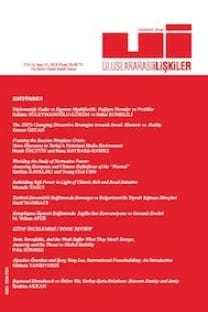The Struggle for Recognition in International Relations: Status, Revisionism, and Rising Powers
Status, Revisionism Rising Powers,
___
- Ibrahim Kumek, Book Review “Michelle Murray, The Struggle for Recognition in International Relations: Status, Revisionism, and Rising Powers, Oxford, Oxford University Press, 2019”, Uluslararasi Iliskiler, Vol. 18, No. 72, 2021, pp. 105-107.
- ISSN: 1304-7310
- Başlangıç: 2004
- Yayıncı: Uluslararası İlişkiler Konseyi Derneği İktisadi İşletmesi
Uluslararası İlişkiler Disiplini ve Niteliksel Yöntem: Türkiye’de Göç Çalışmaları Örneği
Ebru CANAN-SOKULLU, Türkiye’de Uluslararası İlişkiler Eğitimi: Yeni Yaklaşımlar, Yeni Yöntemler
Uluslararası Yatırım Antlaşmalarının İhlalinde Demokratik Yönetişim ve Dolaylı Kamulaştırmanın Rolü
David CARLSON, Jeffrey ZIEGLER
Kıbrıs Sorunu ve Uluslararası Ceza Mahkemesi
Şeref ÇETİNKAYA, Enerji Güvenliği Rusya-Batı Gerilimi ve Türkiye
